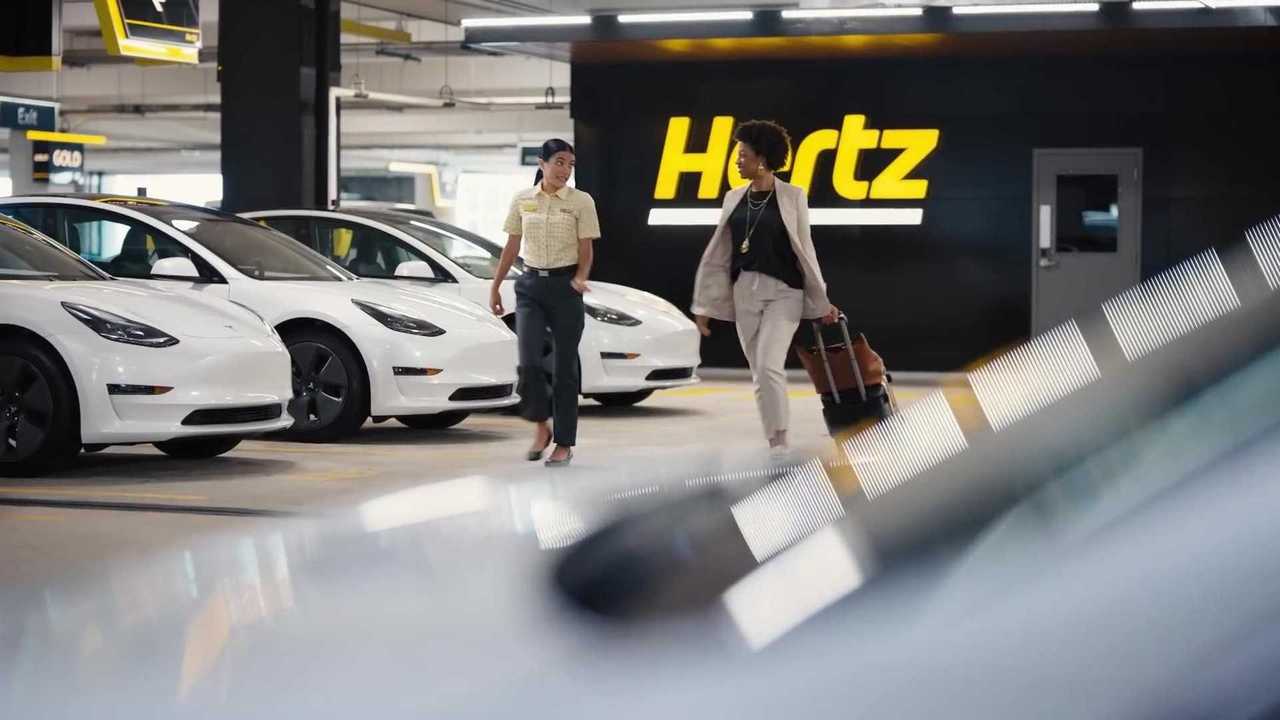Last week, General Motors and Ford announced that they are delaying their spending on electric vehicles (EVs) due to slowing demand and the EV price war initiated by Tesla. It seems that Detroit’s biggest automakers are not the only ones taking a cautious approach to EVs. Hertz, the rental car giant, also revealed on its Q3 earnings call that it is slowing down the pace at which it adds EVs to its fleet.
Two years ago, Hertz made a pledge to order 100,000 Tesla EVs by the end of 2022. However, the company currently only has around 35,000 Tesla vehicles in its fleet, falling short of its original target. Hertz CEO Stephen Scherr stated that the company does not plan on reaching that target anytime soon, as he mentioned, “our in-fleeting of EVs will be slower than our prior expectations.”
The lower-than-expected margins posted by Hertz for the previous quarter were attributed to EV repairs and Tesla’s price cuts, which affected the resale value of Hertz’s EVs by about one-third, according to Scherr.
Despite the setbacks, Hertz remains committed to purchasing 100,000 cars from Tesla and 175,000 EVs from GM. However, the company is no longer on track to have EVs account for a quarter of its fleet by the end of 2024 as previously anticipated.
Hertz is working with Tesla to assess the performance of their cars in order to minimize the risk of damage incidents. As Hertz acquires more EVs from GM and other automakers, it expects these vehicles to have lower damage rates and reduced costs for parts and labor, as explained by Scherr.
Currently, around 80 percent of the EVs in Hertz’s fleet are Teslas, making up about 11 percent of its entire fleet. With approximately 50,000 EVs in its fleet, it can be estimated that around 35,000 of them are Teslas.
Impact of Tesla Price Cuts and Repair Expenses Forces Hertz to Reduce Pace of EV Expansion
Introduction
Tesla’s recent price cuts and the increasing repair expenses associated with their electric vehicles (EVs) have had a notable impact on Hertz’s plans for expanding their EV fleet. Hertz, a prominent car rental company, had previously announced intentions to rapidly expand their EV offerings, but the financial implications of Tesla’s decisions have led them to reassess their strategy. This article explores the reasons behind this shift and the potential consequences for both Tesla and Hertz.
Tesla Price Cuts
Tesla’s decision to lower the prices of their EVs may seem like a positive development for car buyers. However, for companies like Hertz, who purchase a large number of vehicles at once, it poses significant challenges. Lower prices directly affect the residual value of the vehicles, impacting the overall profitability of the rental business. As Hertz aims to maintain a viable rental model, the reduced resale value of EVs due to Tesla’s price cuts has forced them to rethink their expansion plans.
Repair Expenses
Another factor that has influenced Hertz’s decision to slow down their EV expansion is the increasing repair expenses associated with Tesla vehicles. While Tesla had initially promised lower repair costs for their EVs compared to traditional combustion engine vehicles, the reality has been quite different. Hertz has encountered high repair bills, extended repair times, and a lack of available parts, resulting in prolonged periods of vehicle downtime and substantial financial strain.
Financial Implications for Hertz
The combination of Tesla’s price cuts and rising repair expenses has placed Hertz in a difficult financial position. Being a rental company, Hertz heavily relies on the residual value of their fleet to offset costs and ensure profitability. With reduced resale values and expensive repairs, the financial burden on Hertz has increased significantly. As a result, Hertz has announced a reduction in the pace of their EV expansion plans, with a slower adoption of Tesla vehicles within their fleet.
Impact on Tesla
Hertz’s decision to scale back their EV expansion plans could have repercussions for Tesla as well. Tesla has prided itself on its partnership with Hertz as a cornerstone for the proliferation of EVs in the rental sector. Hertz is one of the largest rental car companies globally, and their commitment to EVs was seen as a significant endorsement for Tesla’s electric fleet. However, the recent setbacks may have a negative impact on Tesla’s reputation and its ability to secure partnerships with other car rental companies.
Conclusion
The combination of Tesla’s price cuts and escalating repair expenses has forced Hertz to reevaluate and slow down its plans for expanding its EV fleet. The reduced residual value of Tesla vehicles and increased financial strain from repair costs have played a crucial role in this decision. Both Tesla and Hertz are now faced with significant challenges as they navigate the evolving landscape of the EV industry. The implications of these setbacks may extend beyond just the two companies involved, potentially affecting the perception and adoption of EVs in the car rental sector as a whole.

